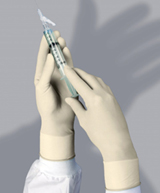 |
 |
Multiple Sclerosis |
Multiple Sclerosis is an autoimmune disease of the neurological system. The person's immune system, specifically autoreactive T cells, react against the myelin sheath which surrounds nerve cells (axons) causing a host of neurological problems. MS is a chronic condition but can lead to blindness, paralysis, depression and dementia over time. There are some 400,000 Americans with MS and perhaps 2.5 million people around the world. Today, best available treatments, though not curative, are provided by a series of Disease Modifying Therapies (DMTs) such as interferon-beta, copaxone, and an emerging group of monoclonal antibodies. DMTs are non-specific and broadly immunoreactive with mechanisms that are not well understood. DMTs must be injected frequently - daily for some, 3 times per week, or a minimum of once every 28 days. side-effects include flu-like symptoms, fatique and malaise. In addition, Injection Site Reactions (ISRs) are commonplace. Despite such shortcomings, the current worldwide market for DMTs reached $6 billion in 2006. Industry experts predict the market will reach $12 billion by 2011.
|
|
|

